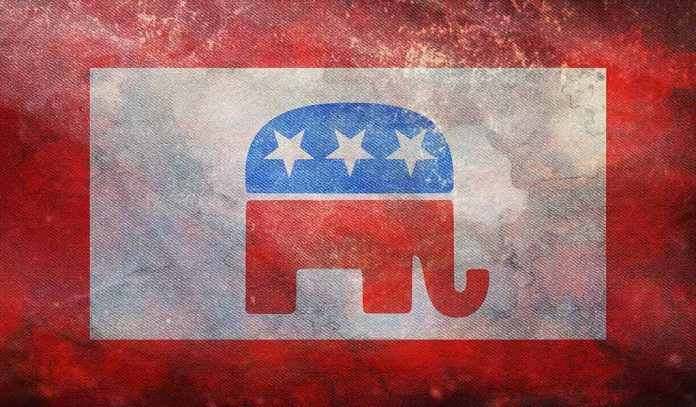
Four Republican senators broke ranks with their party and joined Democrats to block President Trump’s Canada tariffs in a symbolic but significant Senate vote that highlights deepening GOP divisions on trade policy.
Key Takeaways
- The Senate approved a measure to block tariffs on Canada with a 51-48 vote, with Republican senators Mitch McConnell, Susan Collins, Lisa Murkowski, and Rand Paul joining Democrats.
- President Trump directly challenged the four GOP senators on social media, claiming they were “playing into the hands of Radical Left Democrats and Drug Cartels.”
- The measure is largely symbolic as House GOP leadership will not consider it, though it exposes significant policy divisions within the Republican Party.
- Republican leadership argues the tariffs are necessary to address fentanyl trafficking and security threats at the northern border.
- Collins and Paul cited economic concerns and constitutional issues regarding emergency powers as reasons for their opposition to the tariffs.
Senate Republicans Split on Canada Tariffs
In a rare show of bipartisan agreement, the Senate voted 51-48 to block President Trump’s tariffs on Canadian goods. Four Republican senators – Mitch McConnell, Susan Collins, Lisa Murkowski, and Rand Paul – crossed party lines to support the Democratic-led resolution. The measure, spearheaded by Democratic Sen. Tim Kaine of Virginia, aims to terminate the national emergency declaration that serves as the legal basis for imposing the tariffs on America’s northern neighbor.
Despite passing the Senate, the resolution faces an uphill battle as House Republican leadership has indicated they will not bring it to a vote. This makes the Senate’s action largely symbolic, though it highlights significant policy disagreements within the GOP ranks over trade strategy and the use of emergency powers. The tariffs were initially justified by the administration as necessary to enhance border security and halt the flow of fentanyl into the United States.
51-48: The Senate passes a resolution to block Trump's tariffs on Canada.
4 Republicans joined Democrats in voting yes:
• Susan Collins
• Mitch McConnell
• Lisa Murkowski
• Rand PaulThe measure is not expected to get a vote in the House. pic.twitter.com/gHtQaU6Tti
— The Recount (@therecount) April 2, 2025
Trump’s Rebuke of GOP Dissenters
President Trump did not mince words when expressing his displeasure with the Republican senators who opposed his tariff policy. In a pointed message posted on Truth Social, the president urged the four senators to “get on the Republican bandwagon, for a change.” His comments reflected the growing tension between the White House and some members of his own party who have occasionally broken ranks on economic and trade policies.
The president went further, suggesting the senators were acting against America’s interests by potentially enabling drug trafficking. “They are playing with the lives of the American people, and right into the hands of the Radical Left Democrats and Drug Cartels,” Trump stated in his social media post. Senate GOP leadership, including Majority Leader John Thune and Majority Whip John Barrasso, aligned with the president, emphasizing the importance of maintaining the emergency declaration.
Collins and Paul Defend Their Positions
Senator Susan Collins of Maine was particularly vocal in defending her position against the tariffs. Representing a state with significant economic ties to Canada, Collins expressed concern about the potential negative impact on local businesses and cross-border commerce. She questioned the administration’s rationale for using emergency powers to impose tariffs on a close ally, arguing that the fentanyl issue is more relevant to the southern border with Mexico. “Imposing tariffs on Canada, which is our closest neighbor, [a] friendly ally, is a huge mistake and will cause disruption in the economies of both countries,” expressed Collins.
Senator Rand Paul, known for his libertarian-leaning views on trade and executive authority, opposed the tariffs on both economic and constitutional grounds. Paul has consistently argued that Congress, not the executive branch, should have the primary authority to impose tariffs. His position reflects a traditional conservative perspective on limited government power and free markets, creating an interesting dynamic where some of the most conservative members of the Senate are opposing their party’s leadership on trade policy.
National Security Arguments
Senate leadership defended the president’s emergency declaration by citing security concerns at the northern border. Senate Majority Whip John Barrasso pointed to specific threats during floor debate, emphasizing the administration’s position that the tariffs are necessary for national security reasons. Customs and Border Protection reports indicate significant fentanyl seizures over the past two fiscal years, though critics note that most drug trafficking occurs at the southern border.
Democratic Senator Tim Kaine, who introduced the resolution, argued that the emergency declaration was based on a “made up emergency” and that the tariffs would ultimately harm American consumers and businesses. Senate Minority Leader Chuck Schumer echoed this sentiment, characterizing the tariffs as a “tax increase on American families” and urging more Republicans to support the measure to block them.
Sources:
4 Republicans join Senate Democrats to rebuke Trump tariffs on Canada
Trump blasts 4 GOP senators over possibly scrapping Canada tariffs: ‘What is wrong with them’







